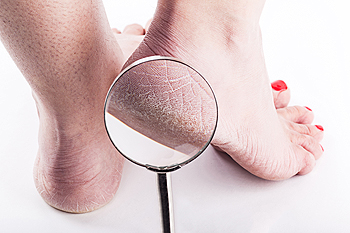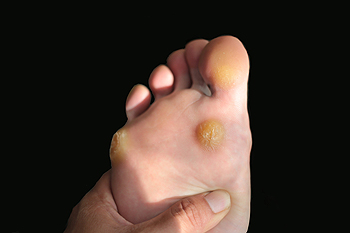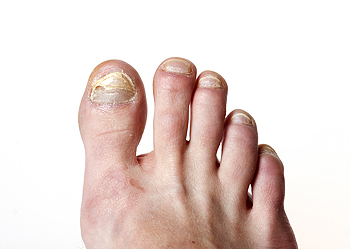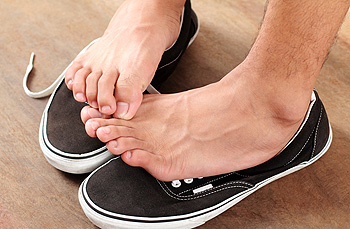 Cracked heels, if left untreated, can be an incredibly uncomfortable condition to deal with. If the cracks or fissures of the heel become deep enough, those affected may experience pain while standing, walking, or when putting any amount of pressure on the heels. Those who are obese, stand for long periods of time, or frequently wear open back shoes, may be more susceptible to developing cracked heels. Some of the first symptoms you may notice with this condition can include a hardening or thickening of the skin on the heels. In some cases, corns or calluses may form on the heel as well. In more severe cases, the heels may become discolored or begin bleeding, which is often indicative that an infection has formed. For more information, or to best treat cracked heels, it is suggested that you consult with a podiatrist for professional care.
Cracked heels, if left untreated, can be an incredibly uncomfortable condition to deal with. If the cracks or fissures of the heel become deep enough, those affected may experience pain while standing, walking, or when putting any amount of pressure on the heels. Those who are obese, stand for long periods of time, or frequently wear open back shoes, may be more susceptible to developing cracked heels. Some of the first symptoms you may notice with this condition can include a hardening or thickening of the skin on the heels. In some cases, corns or calluses may form on the heel as well. In more severe cases, the heels may become discolored or begin bleeding, which is often indicative that an infection has formed. For more information, or to best treat cracked heels, it is suggested that you consult with a podiatrist for professional care.
Cracked heels are unsightly and can cause further damage to your shoes and feet. If you have any concerns, contact Bruce Smit, DPM from Frankfort Foot & Ankle Clinic. Our doctor can provide the care you need to keep you pain-free and on your feet.
Cracked Heels
Cracked heels appear unappealing and can make it harder for you walk around in sandals. Aside from looking unpleasant, cracked heels can also tear stockings, socks, and wear out your shoes. There are several methods to help restore a cracked heel and prevent further damage.
How Do You Get Them?
Dry skin is the number one culprit in creating cracked heels. Many athletes, walkers, joggers, and even swimmers suffer from cracked heels. Age and skin oil production play a role to getting cracked heels as well.
Promote Healing
Over the counter medicines can help, especially for those that need instant relief or who suffer from chronic dry feet.
Wear Socks – Wearing socks with medicated creams helps lock in moisture.
Moisturizers – Applying both day and night will help alleviate dryness which causes cracking.
Pumice Stones – These exfoliate and remove dead skin, which allows for smoother moisturizer application and better absorption into the skin.
Change in Diet
Eating healthy with a well-balanced diet will give the skin a fresh and radiant look. Your body responds to the kinds of food you ingest. Omega-3 fatty acids and zinc supplements can also revitalize skin tissue.
Most importantly, seek professional help if unsure how to proceed in treating cracked heels. A podiatrist will help you with any questions or information needed.
If you have any questions, please feel free to contact our office located in Frankfort, IL . We offer the newest diagnostic and treatment technologies for all your foot care needs.
Athlete’s foot is considered to be a fungal infection that is typically present in between the toes, but may spread to other parts of the body if left untreated. Most cases of athlete’s foot may be treated with the use of over-the-counter sprays or creams. However, some patients have found that they develop this condition more than once, and continuously have tried to get rid of athlete’s foot, but it continues to come back. To help avoid getting athlete’s foot, it’s suggested that you are using the appropriate footwear in public places, such as swimming pools, locker rooms, and communal showers. If you find that you are taking the proper precautionary measures, and are still getting athlete’s foot, please consult with a podiatrist who can help treat your condition, as well as give you professional tips on how to avoid it’s development in the future.
Athlete’s Foot
Athlete’s foot is often an uncomfortable condition to experience. Thankfully, podiatrists specialize in treating athlete’s foot and offer the best treatment options. If you have any questions about athlete’s foot, consult with Bruce Smit, DPM from Frankfort Foot & Ankle Clinic. Our doctor will assess your condition and provide you with quality treatment.
What Is Athlete’s Foot?
Tinea pedis, more commonly known as athlete’s foot, is a non-serious and common fungal infection of the foot. Athlete’s foot is contagious and can be contracted by touching someone who has it or infected surfaces. The most common places contaminated by it are public showers, locker rooms, and swimming pools. Once contracted, it grows on feet that are left inside moist, dark, and warm shoes and socks.
Prevention
The most effective ways to prevent athlete’s foot include:
Symptoms
Athlete’s foot initially occurs as a rash between the toes. However, if left undiagnosed, it can spread to the sides and bottom of the feet, toenails, and if touched by hand, the hands themselves. Symptoms include:
Diagnosis and Treatment
Diagnosis is quick and easy. Skin samples will be taken and either viewed under a microscope or sent to a lab for testing. Sometimes, a podiatrist can diagnose it based on simply looking at it. Once confirmed, treatment options include oral and topical antifungal medications.
If you have any questions, please feel free to contact our office located in Frankfort, IL . We offer the newest diagnostic and treatment technologies for all your foot care needs.
 The medical condition that is known as ingrown toenails can produce severe pain and discomfort. It is defined as the outer edges of the nail growing into the surrounding skin, and typically affects the big toe. It can occur as a result of wearing shoes that do not have adequate room for the toes to move freely in, or from improperly trimming the toenails. Additional reasons why this may happen can include excessively sweaty feet, also referred to as plantar hyperhidrosis, as well as genetic factors, or from a toe injury. Mild relief may be found when the affected toe is soaked in warm water, followed by using a piece of cotton to gently separate the nail from the skin. For more severe cases, it is strongly advised that you seek the counsel of a podiatrist who can properly treat ingrown toenails.
The medical condition that is known as ingrown toenails can produce severe pain and discomfort. It is defined as the outer edges of the nail growing into the surrounding skin, and typically affects the big toe. It can occur as a result of wearing shoes that do not have adequate room for the toes to move freely in, or from improperly trimming the toenails. Additional reasons why this may happen can include excessively sweaty feet, also referred to as plantar hyperhidrosis, as well as genetic factors, or from a toe injury. Mild relief may be found when the affected toe is soaked in warm water, followed by using a piece of cotton to gently separate the nail from the skin. For more severe cases, it is strongly advised that you seek the counsel of a podiatrist who can properly treat ingrown toenails.
Ingrown toenails can become painful if they are not treated properly. For more information about ingrown toenails, contact Bruce Smit, DPM of Frankfort Foot & Ankle Clinic. Our doctor can provide the care you need to keep you pain-free and on your feet.
Ingrown Toenails
Ingrown toenails occur when a toenail grows sideways into the bed of the nail, causing pain, swelling, and possibly infection.
Causes
Prevention
Because ingrown toenails are not something found outside of shoe-wearing cultures, going barefoot as often as possible will decrease the likeliness of developing ingrown toenails. Wearing proper fitting shoes and using proper cutting techniques will also help decrease your risk of developing ingrown toenails.
Treatment
Ingrown toenails are a very treatable foot condition. In minor cases, soaking the affected area in salt or antibacterial soaps will not only help with the ingrown nail itself, but also help prevent any infections from occurring. In more severe cases, surgery is an option. In either case, speaking to your podiatrist about this condition will help you get a better understanding of specific treatment options that are right for you.
If you have any questions please feel free to contact our office located in Frankfort, IL . We offer the newest diagnostic and treatment technologies for all your foot and ankle needs.
 The body’s natural response is to protect itself, which is why the skin may develop a hardened layer of skin in the form of a corn. Corns will typically develop due to an increased level of friction. While this protective layer may be to help the skin of the foot, it can also be very painful and sensitive. To help avoid this, it’s important to wear shoes that put little to no pressure on the feet. If you find your corn to be uncomfortable, some patients have said that soaking the feet in warm water, followed by filing the corn with a pumice stone, can be an effective way to alleviate the pain. If you would like more information on how to best treat your corn, it is recommended that you consult with a podiatrist for professional care and advice.
The body’s natural response is to protect itself, which is why the skin may develop a hardened layer of skin in the form of a corn. Corns will typically develop due to an increased level of friction. While this protective layer may be to help the skin of the foot, it can also be very painful and sensitive. To help avoid this, it’s important to wear shoes that put little to no pressure on the feet. If you find your corn to be uncomfortable, some patients have said that soaking the feet in warm water, followed by filing the corn with a pumice stone, can be an effective way to alleviate the pain. If you would like more information on how to best treat your corn, it is recommended that you consult with a podiatrist for professional care and advice.
Corns can make walking very painful and should be treated immediately. If you have questions regarding your feet and ankles, contact Bruce Smit, DPM of Frankfort Foot & Ankle Clinic. Our doctor will treat your foot and ankle needs.
Corns: What Are They? And How Do You Get Rid of Them?
Corns are thickened areas on the skin that can become painful. They are caused by excessive pressure and friction on the skin. Corns press into the deeper layers of the skin and are usually round in shape.
Ways to Prevent Corns
There are many ways to get rid of painful corns such as:
Treating Corns
Although most corns slowly disappear when the friction or pressure stops, this isn’t always the case. Consult with your podiatrist to determine the best treatment option for your case of corns.
If you have any questions please feel free to contact our office located in Frankfort, IL . We offer the newest diagnostic and treatment technologies for all your foot and ankle needs.
 Research has indicated that more than fifty percent of women may experience foot conditions during their pregnancies. Some of these can include flat feet, heel pain, and the heels may become dry and cracked. Moderate relief may be found from flat feet, by wearing shoes that are supportive and have a firm heel. Plantar fasciitis may occur from standing for the majority of the day, which usually causes pain felt in the heel region. It is also suggested to rest the feet as often as possible throughout your pregnancy to help avoid swelling. Cracked heels may be avoided when the feet are washed, followed by using a good moisturizer. If you would like additional information about how to prevent uncomfortable foot conditions during your pregnancy, please consult with a podiatrist.
Research has indicated that more than fifty percent of women may experience foot conditions during their pregnancies. Some of these can include flat feet, heel pain, and the heels may become dry and cracked. Moderate relief may be found from flat feet, by wearing shoes that are supportive and have a firm heel. Plantar fasciitis may occur from standing for the majority of the day, which usually causes pain felt in the heel region. It is also suggested to rest the feet as often as possible throughout your pregnancy to help avoid swelling. Cracked heels may be avoided when the feet are washed, followed by using a good moisturizer. If you would like additional information about how to prevent uncomfortable foot conditions during your pregnancy, please consult with a podiatrist.
Pregnant women with swollen feet can be treated with a variety of different methods that are readily available. For more information about other cures for swollen feet during pregnancy, consult with Bruce Smit, DPM from Frankfort Foot & Ankle Clinic. Our doctor will attend to all of your foot and ankle needs.
What Foot Problems Can Arise During Pregnancy?
One problem that can occur is overpronation, which occurs when the arch of the foot flattens and tends to roll inward. This can cause pain and discomfort in your heels while you’re walking or even just standing up, trying to support your baby.
Another problem is edema, or swelling in the extremities. This often affects the feet during pregnancy but tends to occur in the later stages.
How Can I Keep My Feet Healthy During Pregnancy?
If you have any questions please feel free to contact our office located in Frankfort, IL . We offer the newest diagnostic and treatment technologies for all your foot and ankle needs.
 Research has indicated that running shoes are the most important purchase a runner can make. There are several choices available, which is why it is beneficial that proper knowledge is acquired before a purchase is made. There are three portions of each running shoe, consisting of the upper, midsole, and outsole. The upper keeps the foot stable, and consists of the laces and tongue of the shoe. The midsole contains cushioning and governs how the foot moves in the shoe. The outsole controls the traction of how the shoe operates on pavement or trails. Some runners prefer a minimal shoe, which may feel similar to running barefoot. Other runners may enjoy running in shoes that have maximum cushioning and support. If you are interested in buying running shoes, it is advised that you consult with a podiatrist for advice on what style of shoe is best suited for your running preferences.
Research has indicated that running shoes are the most important purchase a runner can make. There are several choices available, which is why it is beneficial that proper knowledge is acquired before a purchase is made. There are three portions of each running shoe, consisting of the upper, midsole, and outsole. The upper keeps the foot stable, and consists of the laces and tongue of the shoe. The midsole contains cushioning and governs how the foot moves in the shoe. The outsole controls the traction of how the shoe operates on pavement or trails. Some runners prefer a minimal shoe, which may feel similar to running barefoot. Other runners may enjoy running in shoes that have maximum cushioning and support. If you are interested in buying running shoes, it is advised that you consult with a podiatrist for advice on what style of shoe is best suited for your running preferences.
If you are a runner, wearing the right running shoe is essential. For more information, contact Bruce Smit, DPM from Frankfort Foot & Ankle Clinic. Our doctor can provide the care you need to keep you pain-free and on your feet.
Choosing the Right Running Shoe for Your Foot Type
To increase performance and avoid the risk of injury, it is important to choose the right running shoe based on your foot type. The general design of running shoes revolves around pronation, which is how the ankle rolls from outside to inside when the foot strikes the ground.
If you have any questions please feel free to contact our office located in Frankfort, IL . We offer the newest diagnostic and treatment technologies for all your foot and ankle needs.
Read more about Choosing the Right Running Shoe for Your Foot Type The common symptoms of toenail fungus are yellow, brown, or discolored nails. In severe cases, they may crack, and can appear unsightly. It can develop as a result of an injury that has happened to the nail, or medical conditions that can include diabetes or a weakened immune system. The fungus that causes this type of infection lives and thrives in warm and moist environments. These places can often consist of public swimming pools, locker rooms, and surrounding areas. If you desire to get frequent pedicures, it is important to ensure the tools that are used are properly sterilized. If you have any of the above mentioned symptoms, it is advised that you consult with a podiatrist who can properly diagnose your ailment and offer proper treatment techniques.
The common symptoms of toenail fungus are yellow, brown, or discolored nails. In severe cases, they may crack, and can appear unsightly. It can develop as a result of an injury that has happened to the nail, or medical conditions that can include diabetes or a weakened immune system. The fungus that causes this type of infection lives and thrives in warm and moist environments. These places can often consist of public swimming pools, locker rooms, and surrounding areas. If you desire to get frequent pedicures, it is important to ensure the tools that are used are properly sterilized. If you have any of the above mentioned symptoms, it is advised that you consult with a podiatrist who can properly diagnose your ailment and offer proper treatment techniques.
For more information about treatment, contact Bruce Smit, DPM of Frankfort Foot & Ankle Clinic. Our doctor can provide the care you need to keep you pain-free and on your feet.
Toenail Fungus Treatment
Toenail fungus is a condition that affects many people and can be especially hard to get rid of. Fortunately, there are several methods to go about treating and avoiding it.
Antifungals & Deterrence
Oral antifungal medicine has been shown to be effective in many cases. It is important to consult with a podiatrist to determine the proper regiment for you, or potentially explore other options.
Applying foot powder on the feet and shoes helps keep the feet free of moisture and sweat.
Sandals or open toed shoes – Wearing these will allow air movement and help keep feet dry. They also expose your feet to light, which fungus cannot tolerate. Socks with moisture wicking material also help as well.
If you have any questions please feel free to contact our office located in Frankfort, IL . We offer the newest diagnostic tools and technology to treat your foot and ankle needs.
 The medical ailment that is known as athlete’s foot often causes discomfort. It is a fungus that affects the skin on the feet. It can produce symptoms that may consist of intense itching between the toes and on the bottom of the feet, the skin may become dry and cracked, and the toenails may become discolored. This condition can develop as a result of wearing shoes and socks that are too tight, and walking barefoot in public areas that include swimming pools, locker rooms, and communal showers. This contagious fungus lives and thrives in warm and moist environments, which is why it is recommended to wear appropriate shoes while in these places. If you have become afflicted with athlete’s foot, it is advised that you are under the care of a podiatrist who can determine the best course of treatment for you.
The medical ailment that is known as athlete’s foot often causes discomfort. It is a fungus that affects the skin on the feet. It can produce symptoms that may consist of intense itching between the toes and on the bottom of the feet, the skin may become dry and cracked, and the toenails may become discolored. This condition can develop as a result of wearing shoes and socks that are too tight, and walking barefoot in public areas that include swimming pools, locker rooms, and communal showers. This contagious fungus lives and thrives in warm and moist environments, which is why it is recommended to wear appropriate shoes while in these places. If you have become afflicted with athlete’s foot, it is advised that you are under the care of a podiatrist who can determine the best course of treatment for you.
Athlete’s foot is an inconvenient condition that can be easily reduced with the proper treatment. If you have any concerns about your feet and ankles, contact Bruce Smit, DPM from Frankfort Foot & Ankle Clinic. Our doctor will treat your foot and ankle needs.
Athlete’s Foot: The Sole Story
Athlete's foot, also known as tinea pedis, can be an extremely contagious foot infection. It is commonly contracted in public changing areas and bathrooms, dormitory style living quarters, around locker rooms and public swimming pools, or anywhere your feet often come into contact with other people.
Solutions to Combat Athlete’s Foot
Athlete’s foot can cause many irritating symptoms such as dry and flaking skin, itching, and redness. Some more severe symptoms can include bleeding and cracked skin, intense itching and burning, and even pain when walking. In the worst cases, Athlete’s foot can cause blistering as well. Speak to your podiatrist for a better understanding of the different causes of Athlete’s foot, as well as help in determining which treatment options are best for you.
If you have any questions please feel free to contact our office located in Frankfort, IL . We offer the newest diagnostic and treatment technologies for all your foot and ankle needs.